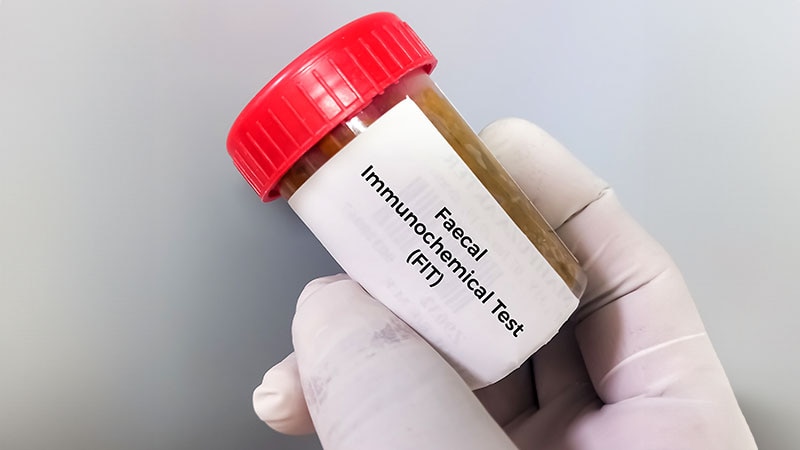Next-Generation mt-sDNA Test vs. FIT for CRC Screening
Kernekoncepter
Next-generation mt-sDNA test shows higher sensitivity but lower specificity compared to FIT for CRC screening.
Resumé
The next-generation multitarget stool DNA (mt-sDNA) test for colorectal cancer (CRC) screening demonstrated higher sensitivity for all screening-relevant lesions but lower specificity than the currently available fecal immunochemical test (FIT). The study aimed to improve specificity without compromising sensitivity, addressing the need for more accurate and noninvasive screening methods to enhance adherence to CRC screening guidelines.
Key Highlights:
- Next-generation mt-sDNA test by Exact Sciences Corporation showed almost 94% sensitivity for CRC.
- Sensitivity for advanced precancerous lesions was over 43%, with nearly 91% specificity for advanced neoplasia.
- The new test aimed to address feedback on low specificity while maintaining high sensitivity for CRC.
- Improved specificity by 30% for advanced neoplasia compared to the previous version of Cologuard.
- Higher specificity expected to reduce false positive rates and unnecessary colonoscopies.
Testing Details:
- Study evaluated almost 21,000 asymptomatic participants aged 40 and older undergoing screening colonoscopy.
- The new DNA test identified 92 out of 98 participants with CRC and 76 out of 82 participants with screening-relevant cancers.
- Comparison with OC-AUTO FIT by Polymedco showed varying sensitivity and specificity rates for different lesions.
Future Implications:
- Further research needed to determine the test's acceptability, adherence rates, and cost-effectiveness.
- Importance of reducing the incidence and mortality of colorectal cancer through effective screening methods.
- Considerations for cost-effectiveness, testing intervals, and population-based screening strategies.
Tilpas resumé
Genskriv med AI
Generer citater
Oversæt kilde
Til et andet sprog
Generer mindmap
fra kildeindhold
Besøg kilde
www.medscape.com
CRC: Next-Generation mt-sDNA Test Beats FIT for Sensitivity
Statistik
The multitarget assay showed a sensitivity for CRC of almost 94%.
Specificity for advanced neoplasia was nearly 91%.
The comparator FIT had a specificity of 94.8% for advanced neoplasia.
Citater
"The test's manufacturer developed a new version of its existing Cologuard FIT/DNA test because it took to heart the feedback from primary care providers and gastroenterologists about the test's low specificity."
"Many physicians felt there were too many false positives with the existing version, and that is anxiety-provoking in patients and providers."
"It is hoped that these newer tests will increase use and adherence and elevate the percentage of the population undergoing screening in order to reduce deaths from colorectal cancer."
Vigtigste indsigter udtrukket fra
by Diana Swift kl. www.medscape.com 03-25-2024
https://www.medscape.com/s/viewarticle/crc-next-generation-mt-sdna-test-beats-fit-sensitivity-not-2024a10005m3
Dybere Forespørgsler
How can the healthcare system address the challenges of improving CRC screening adherence?
Improving CRC screening adherence can be addressed through various strategies. Firstly, increasing awareness among the general population and healthcare providers about the importance of CRC screening and the availability of different screening options can help encourage more individuals to undergo screening. Implementing reminder systems, such as automated notifications for screening appointments, can also help improve adherence rates. Additionally, offering flexible and convenient screening options, such as at-home tests like the mt-sDNA test, can make it easier for individuals to participate in screening. Targeted outreach programs for underserved populations and those with lower screening rates can also help improve adherence and reduce disparities in CRC screening rates.
What are the potential drawbacks of relying solely on noninvasive screening tests for CRC detection?
While noninvasive screening tests like the mt-sDNA test offer advantages such as convenience and ease of use, there are potential drawbacks to relying solely on these tests for CRC detection. One drawback is the lower specificity of some noninvasive tests compared to invasive tests like colonoscopy, which can lead to false positive results and unnecessary follow-up procedures. Noninvasive tests may also have limitations in detecting certain types of lesions or early-stage cancers, potentially leading to missed diagnoses. Additionally, the cost of noninvasive tests and the need for repeat testing at regular intervals can be a concern for healthcare systems and individuals. Therefore, a combination of noninvasive and invasive screening methods may be necessary to ensure comprehensive and accurate CRC detection.
How can advancements in DNA testing technology impact the future of cancer screening beyond colorectal cancer?
Advancements in DNA testing technology have the potential to revolutionize cancer screening beyond colorectal cancer. These advancements can lead to the development of more sensitive and specific tests for detecting various types of cancer at early stages, allowing for timely intervention and improved outcomes. DNA testing can enable the identification of specific genetic mutations or biomarkers associated with different types of cancer, facilitating personalized screening approaches based on an individual's genetic risk factors. Furthermore, advancements in DNA testing technology can support the shift towards liquid biopsy tests that analyze circulating tumor DNA in blood samples, offering a less invasive and more accessible method for cancer detection and monitoring. As DNA testing technology continues to evolve, it holds promise for enhancing early detection, precision medicine, and overall cancer care across different types of cancer.
0
